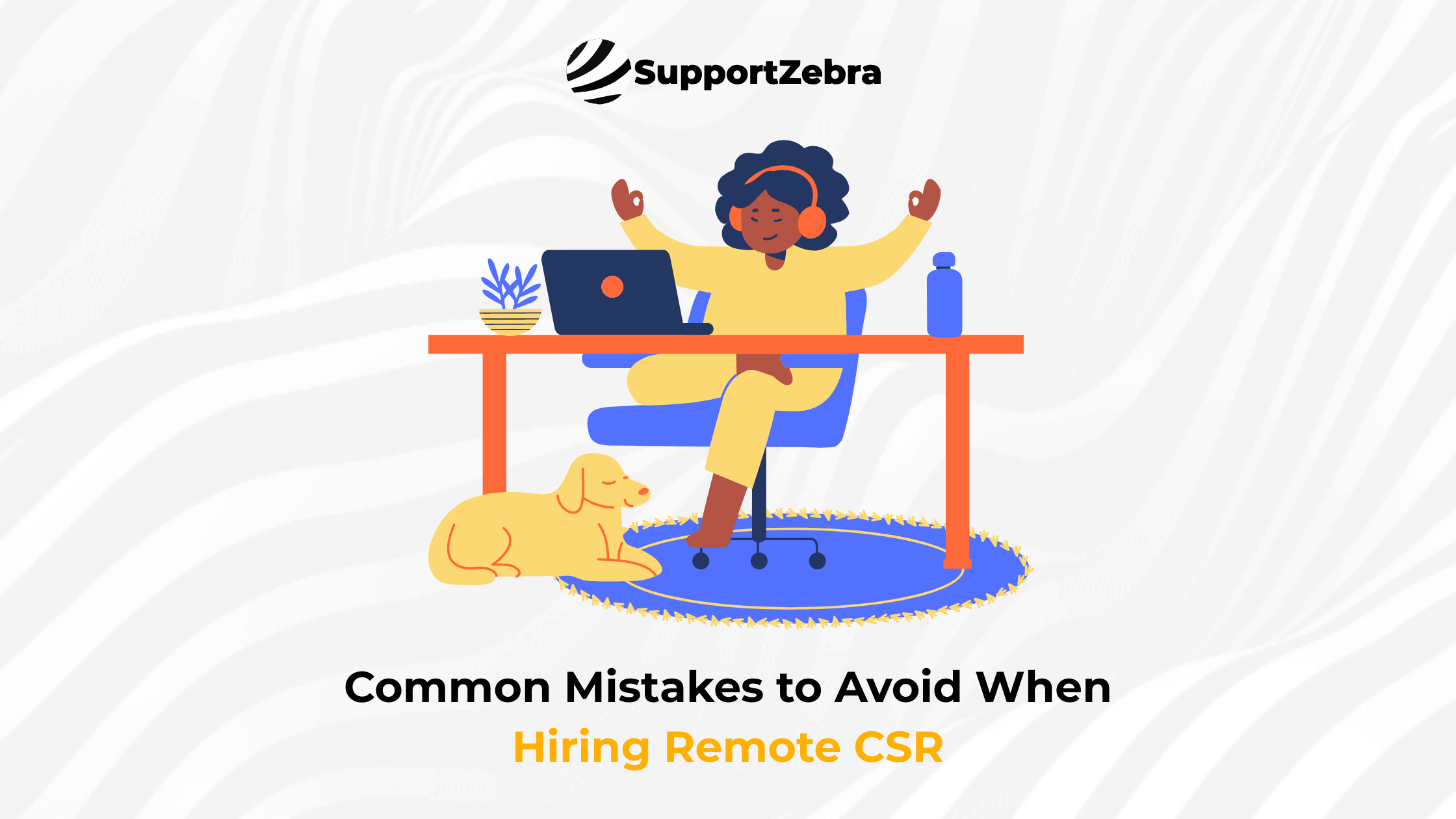Red Flags to Watch Out for When Hiring Remote Customer Service Agents
Key Takeaways:
- Vague job descriptions and unclear expectations can lead to poor hiring decisions and mismatches between candidates and roles.
- Strong communication skills and cultural fit matter more than just technical experience when building remote support teams.
- Rushing the hiring process or skipping onboarding often leads to performance issues and higher turnover.
- Smart hiring practices, like skills testing, time zone planning, and long-term investment, set your remote team up for success.
Hiring remote customer service staff can be tough. Maybe you’ve seen team members struggle, or customers haven’t been as happy as you hoped. It’s easy to feel worried when things aren’t going well and to wonder if you made the wrong choices.
Mistakes when hiring the wrong remote staff can lead to unhappy customers and stress for your whole team. If these problems continue, you could even lose customers and hurt your company’s reputation.
There’s a way to fix this. With the right support, you can build a strong remote team that keeps your customers satisfied and enhances your business’s reputation. Let’s examine how to avoid these common mistakes and identify the best candidates for your team.
What Happens if You Skip Clear Job Descriptions?
If you don’t write a clear job description, you risk attracting the wrong applicants. Many companies make this mistake when they’re in a hurry to hire. They list general skills and duties, but don’t explain what the job is really about. That leads to mismatched expectations.
A strong job description should:
- Clearly state if the job is fully remote, hybrid, or location-based
- List the tools or systems the rep will be using
- Outline day-to-day responsibilities in plain language
- Describe your ideal candidate’s communication style and experience level
- Mention shift hours, time zone expectations, and required languages (if any)
Taking time to write the right job description helps filter out unqualified applicants early. It also provides serious candidates with the clarity they need to determine if the role is a good fit.
Why Is Cultural Fit Important Even in Remote Roles?
Even if your rep works from a different city or country, they still need to reflect your brand’s values and tone. Many businesses forget this and hire based only on experience or resume keywords. That can lead to poor team dynamics, low engagement, and inconsistent customer interactions.
To assess cultural fit remotely:
- Include behavioural questions during the interview
- Ask how they would handle real scenarios based on your brand’s voice
- Look for alignment with your company’s mission and tone
- Ask them what kind of team culture they enjoy
You don’t need clones, but you do need people who will work well with your team and accurately represent your business.
Do Technical Skills Matter More Than Communication?
Not really. Technical tools can be taught. But if your rep struggles to communicate clearly and kindly, it will reflect poorly on your brand. Some businesses focus too much on whether a candidate knows a specific CRM or support tool, rather than on how well they communicate.
Look for reps who can:
- Listen actively and respond calmly under pressure
- Write clear and simple emails or messages
- Speak professionally but warmly
- Adapt their tone to match different types of customers
- Ask helpful follow-up questions
If they can do this, the technical stuff can follow. Good communication is the foundation of great customer service.
What Are the Risks of Rushing the Hiring Process?

When you’re short on staff, it’s tempting to fast-track hiring. However, this leads to bigger problems later, such as turnover, poor reviews, or internal tension. Hiring the wrong person often costs more than waiting for the right one.
Here’s what to avoid:
- Skipping reference checks
- Offering the job after just one short interview
- Not testing their customer service skills
- Overlooking red flags during conversations
- Ignoring time zone differences that affect coverage
Instead, build a structured but straightforward process. Take the time to assess each candidate fairly and objectively. It’s worth the extra effort up front.
How Does Poor Onboarding Affect Performance?
Some companies assume that remote workers will “figure it out.” But without a strong onboarding process, even great hires can fall behind or feel unsupported.
A good remote onboarding plan should:
- Walk through the tools and platforms they’ll use
- Introduce them to key team members
- Share customer service scripts, guidelines, and FAQs
- Assign a buddy or manager check-in during the first month
- Set clear performance goals and timelines
Remote reps don’t have the luxury of asking a co-worker at the next desk. Your process should be detailed, repeatable, and supportive from day one.
Should You Hire Just One Rep at a Time?
Hiring one person at a time might seem like a safer choice, but it can actually slow you down, especially if you’re growing. Hiring in small groups (even two or three at once) allows you to test and train more efficiently. It also gives new reps peers to connect with, which boosts morale.
Hiring in batches works best when you:
- Have a training system ready to scale
- Need flexible scheduling coverage
- Want to test different skill sets quickly
- Plan to grow your team fast
Of course, it’s still important to vet each person carefully. But hiring in small waves often creates a stronger support network.
Can Time Zone Issues Cause Customer Service Delays?
Yes, and they often do. Businesses sometimes hire reps without checking how their working hours align with customer demand. This creates gaps in coverage and longer response times, both of which frustrate customers.
To avoid time zone headaches:
- Map out your busiest support hours
- Choose reps whose workday overlaps with those hours
- Use scheduling software to fill in time gaps
- Offer flexible shifts where possible
- Be clear about time zone expectations in the job post
Smart scheduling keeps your support team responsive, and your customers happy.
How Do Vague Performance Expectations Hurt Your Team?
When you don’t set clear performance standards, your reps are left guessing. They might overemphasize speed, underemphasize quality, or simply feel unsure of how they’re doing. This leads to inconsistent service and low morale.
What to define early:
- Response time goals (e.g., answer within 1 hour)
- Quality benchmarks (e.g., tone, accuracy, issue resolution)
- Customer satisfaction (CSAT) targets
- Escalation rules and limits
- Regular check-ins or coaching plans
Clarity gives your team confidence, and helps you measure success in a fair, consistent way.
Is Relying Only on Resumes a Hiring Trap?

Yes. Resumes only show what someone says they can do. To find out what they actually can do, you need to go deeper. Many hiring managers skip tests or trial tasks because they take extra time. However, skipping this step often yields disappointing results.
Add these steps to your hiring flow:
- A short written or video task
- A sample support chat or email reply
- A short roleplay exercise during the interview
- A values-based questionnaire
This provides you with genuine insight into how they think, write, and speak. You’ll also weed out people who aren’t genuinely interested in the role.
How Can You Avoid Underinvesting in Remote Support Roles?
Remote customer service isn’t just a “cost-saving” move—it’s part of your customer experience. Some companies treat it like a basic task and pay little attention to training, career growth, or team support. This often results in high turnover and lower service quality.
To build a stronger remote team:
- Offer training that goes beyond just tools
- Give regular feedback and celebrate wins
- Provide clear growth paths and incentives
- Invest in team culture and engagement
- Treat remote reps as core team members, not just support staff
When you value your remote reps, they give better support—and they stay longer.
Hire Smarter and Faster with SupportZebra’s Remote Customer Service Solutions
Hiring remote customer service representatives can bring great value to your business if you do it right. Avoiding these common mistakes helps you build a team that’s skilled, motivated, and aligned with your brand. It’s not just about filling a seat; it’s about finding the right people to support your customers and grow with your business.
At SupportZebra, we help you avoid common hiring pitfalls by providing trained, reliable, and brand-aligned customer service talent, ready to scale with your business. Let us build your ideal remote support team.

